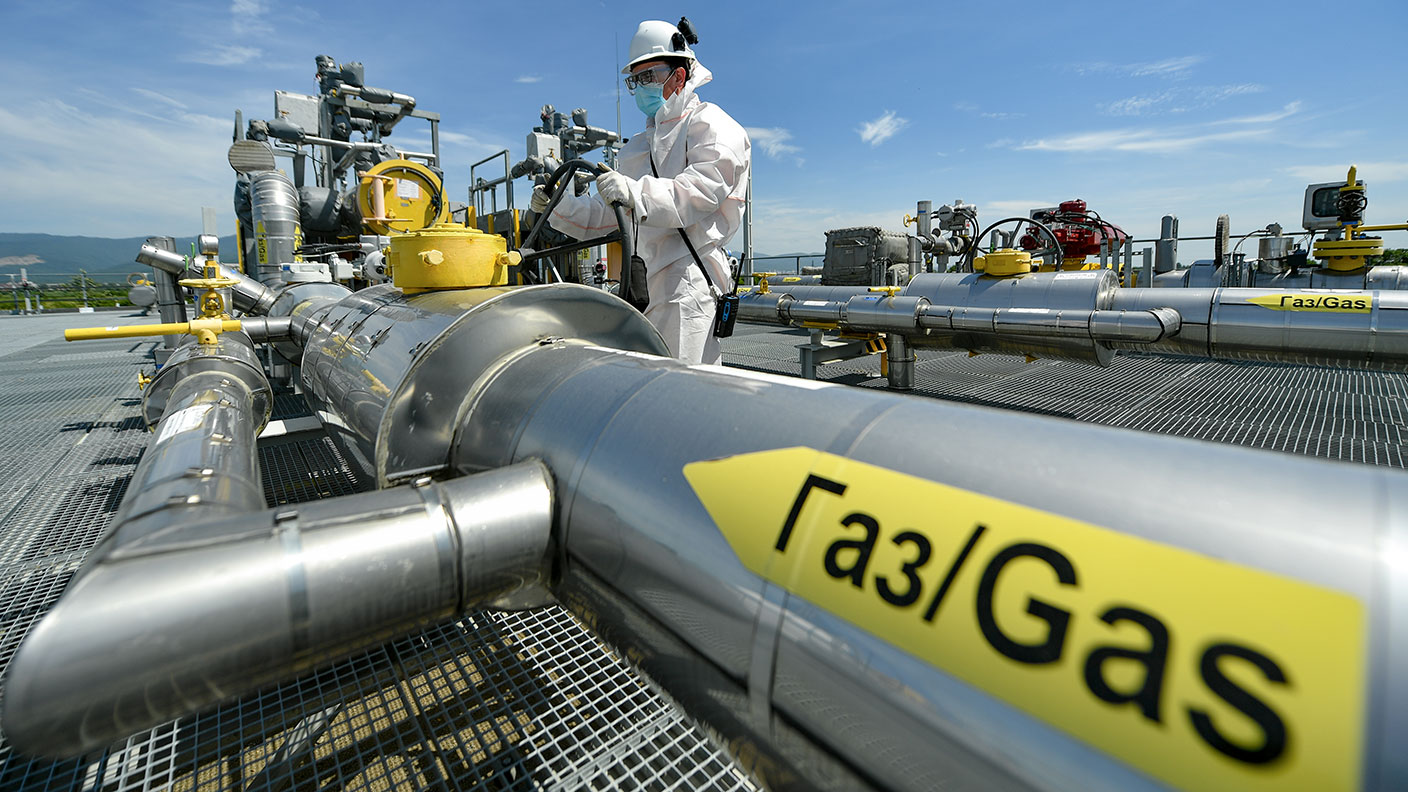How to invest as natural gas prices soar
Gas prices have fallen from their recent highs, but prices are still many times higher than they were last year. Saloni Sardana looks at why supply is so low, and how you can invest in natural gas.


Get the latest financial news, insights and expert analysis from our award-winning MoneyWeek team, to help you understand what really matters when it comes to your finances.
You are now subscribed
Your newsletter sign-up was successful
Want to add more newsletters?

Twice daily
MoneyWeek
Get the latest financial news, insights and expert analysis from our award-winning MoneyWeek team, to help you understand what really matters when it comes to your finances.

Four times a week
Look After My Bills
Sign up to our free money-saving newsletter, filled with the latest news and expert advice to help you find the best tips and deals for managing your bills. Start saving today!
When even Russian president Vladimir Putin feels he has to intervene to take some of the steam out of natural gas prices, it suggests that something is very wrong with the market.
Yet that’s exactly what happened on Wednesday this week. Putin said Russia “can reach another record of deliveries of our energy resources to Europe, including gas” (of course, he also noted that swift approval for its contentious Nord Stream 2 natural gas pipeline to Germany could help).
In any case, his comments helped to send the price of gas lower from its recent spike. But prices are still many times higher than they were last year.
MoneyWeek
Subscribe to MoneyWeek today and get your first six magazine issues absolutely FREE

Sign up to Money Morning
Don't miss the latest investment and personal finances news, market analysis, plus money-saving tips with our free twice-daily newsletter
Don't miss the latest investment and personal finances news, market analysis, plus money-saving tips with our free twice-daily newsletter
So – to offset your rising domestic energy bill, if nothing else – who’s making money from this and can you invest in them?
Why are we so low on natural gas?
For a number of years the world has enjoyed an oversupply of gas. Now the opposite problem is plaguing energy markets.
Natural gas prices have shot up for several reasons.
A cold winter in 2020 meant that global demand was high, which depleted existing supplies in storage. Usually gas reserves would be filled up in summer, but instead, producers were running on reduced output because they had to catch up on maintenance which had been delayed due to lockdowns.
So we’re starting from a position of lower-than-normal reserves – and that’s even as the wider economy is recovering post-lockdowns.
This has then been exacerbated on many fronts by the weather. Summer heatwaves in Europe prompted a big increase in demand for air conditioning and refrigeration, while in the UK, calmer weather has caused a dramatic drop in windspeeds, cutting the amount of electricity produced by wind turbines.
That’s driven demand for gas up significantly, as it is the UK’s main alternative fuel for power stations.
Adding to this has been unusually high demand for liquefied natural gas (LNG) in Asia as well – this is a global shortage. As the Financial Times points out, “Europe is usually the end market for a substantial share of the world’s LNG. However, competition for the commodity has meant European LNG imports declined sharply this summer.”
LNG is simply natural gas converted to liquid form, making it easier to transport by sea rather than via pipelines. Clearly however, this requires specially-equipped ships and ports to move and unload safely.
So who really benefits from a surge in LNG demand? As Hellenic Shipping News Worldwide points out: “in the booming market for supercooled natural gas, the most precious commodity is the ship.”
LNG freight prices already reflect this buoyant demand for gas. The daily charter rate for a tri-fuel diesel-electric (TFDE) vessel capable of carrying 160,000 cubic metres of LNG to Pacific Basin ports hit $76,000 a day on Tuesday, the highest level seen since February this year.
“A typical spot LNG cargo of 3.4 trillion British thermal units delivered into North Asia in November is currently worth about $135m and any rise in shipping costs will further drive up cargo costs,” adds Reuters.
So what are the best ways to invest in natural gas?
Gas prices will clearly continue to be volatile. But given the surge in prices we’ve already seen and the need to fill up storage for next year, it’s hard to imagine that producers and those providing essential services and equipment for the industry aren’t going to continue to benefit for some time.
The most obvious beneficiaries are the producers. One of the most straightforward plays for UK investors is Royal Dutch Shell (LSE: RDSA). As Russ Mould of AJ Bell puts it: “ a wall of cash looks set to come the company’s way thanks to the recent surge in energy prices… Shell’s decision to pivot towards natural gas over the last decade has left it well positioned for the current market.”
The Motley Fool suggests French group TotalEnergies (Paris: TTE) (previously Total) as another option to consider, as it’s the world’s second-largest publicly-traded LNG operator. And for those considering investing in US stocks, Cheniere Energy (NYSE: LNG) is America’s leading LNG producer and also a major exporter. It’s also working on carbon-neutral LNG cargoes.
Another option is to consider shipping stocks. My colleague David Stevenson looked at a couple of shipping portfolio companies to consider in a recent issue of MoneyWeek magazine. If you’re not already a subscriber, get your first six issues free here.
Get the latest financial news, insights and expert analysis from our award-winning MoneyWeek team, to help you understand what really matters when it comes to your finances.
Saloni is a web writer for MoneyWeek focusing on personal finance and global financial markets. Her work has appeared in FTAdviser (part of the Financial Times), Business Insider and City A.M, among other publications. She holds a masters in international journalism from City, University of London.
Follow her on Twitter at @sardana_saloni
-
 Should you buy an active ETF?
Should you buy an active ETF?ETFs are often mischaracterised as passive products, but they can be a convenient way to add active management to your portfolio
-
 Power up your pension before 5 April – easy ways to save before the tax year end
Power up your pension before 5 April – easy ways to save before the tax year endWith the end of the tax year looming, pension savers currently have a window to review and maximise what’s going into their retirement funds – we look at how
-
 EPC rating standards for private landlords set for major overhaul amid ‘biggest ever’ energy efficiency push
EPC rating standards for private landlords set for major overhaul amid ‘biggest ever’ energy efficiency pushNews The government wants landlords to achieve an EPC rating of at least C in private rented homes. The policy revives plans previously put forward by the Conservatives.
-
 Halifax: House price slump continues as prices slide for the sixth consecutive month
Halifax: House price slump continues as prices slide for the sixth consecutive monthUK house prices fell again in September as buyers returned, but the slowdown was not as fast as anticipated, latest Halifax data shows. Where are house prices falling the most?
-
 Rents hit a record high - but is the opportunity for buy-to-let investors still strong?
Rents hit a record high - but is the opportunity for buy-to-let investors still strong?UK rent prices have hit a record high with the average hitting over £1,200 a month says Rightmove. Are there still opportunities in buy-to-let?
-
 Pension savers turn to gold investments
Pension savers turn to gold investmentsInvestors are racing to buy gold to protect their pensions from a stock market correction and high inflation, experts say
-
 Where to find the best returns from student accommodation
Where to find the best returns from student accommodationStudent accommodation can be a lucrative investment if you know where to look.
-
 The world’s best bargain stocks
The world’s best bargain stocksSearching for bargain stocks with Alec Cutler of the Orbis Global Balanced Fund, who tells Andrew Van Sickle which sectors are being overlooked.
-
 Revealed: the cheapest cities to own a home in Britain
Revealed: the cheapest cities to own a home in BritainNew research reveals the cheapest cities to own a home, taking account of mortgage payments, utility bills and council tax
-
 UK recession: How to protect your portfolio
UK recession: How to protect your portfolioAs the UK recession is confirmed, we look at ways to protect your wealth.
